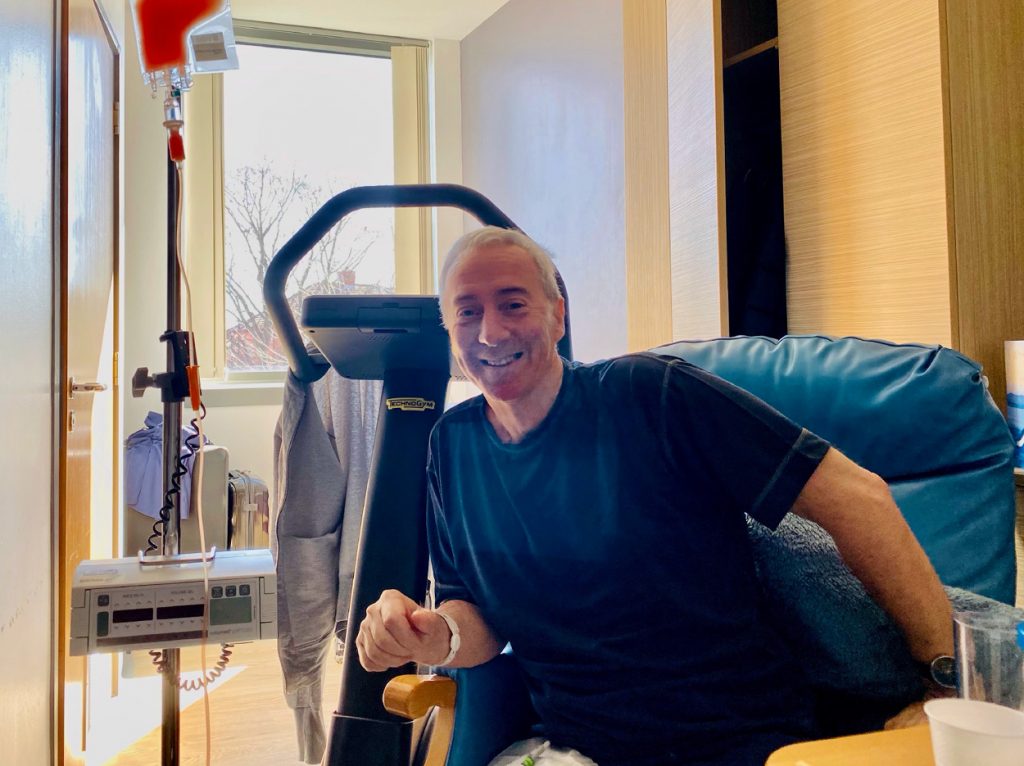
Former Transplant Patient To Tackle London2Paris
Nick Topley first took up cycling to aid his recovery from a Bone Marrow Transplant in 2012
Today, we hear the story of Douglas Morton, who was diagnosed with Acute Myeloid Leukaemia – a type of blood cancer that affects bone marrow – and was enrolled on a clinical trial at the Freeman Hospital in Newcastle.
Doug first noticed that something be wrong with his body back in August 2021, which, at the time, he ignored the unusual shortage of breath after only a short walk uphill. Although he classes himself as a very fit guy, he was aware that this wasn’t normal but thought it would pass eventually. He then developed a throat infection which wouldn’t clear and despite home treatment, became progressively worse until he became very ill and by now the breathlessness was starting to worry him and his wife.
He called the Doctor and he insisted that Doug must come in to get it checked out – he very rarely visited the Doctor so he figured this must be significant. After examination he concluded it might be a viral infection and so they decided to wait and see for a week. If symptoms changed over that week, then he was instructed to check in.
Just as he thought he was starting to feel a little better, Doug collapsed onto the kitchen floor. So it was off to the doctors again and this time bloods were taken. The same day, his Doctor phoned him to say that his white cells were low and he arranged for him to fast track through A&E at Cramlington Hospital.
It didn’t pan out that way and so Doug was admitted into A&E with no back story and was discharged the following day having had a Vitamin B12 injection and the plan was to follow this up with a series of injections delivered at home by the District Nurse.
“It didn’t feel right to us and so we arranged a private telephone consultation with a haematology specialist. His advice was clear that I should have an urgent marrow biopsy to properly complete the diagnosis.”
“We contacted the team at Hexham and the next day they slotted me in to the last appointment to have the test done. The results informed a haematology consultant who had the unenviable task of letting us know that I had AML.”
“I don’t tend to panic easily and so I quickly accepted what had happened and we knew it was serious. We “Googled” a couple of trusted sites, just to explore the territory a little to enable us to do the really hard thing which was to tell our close loved ones the outcome.”
“It helped us prepare for the meeting with the Consultant, which, when it came, was really reassuring. We learned in an unhurried way that there is a treatment process which is well established and though it does carry significant risk we had a good prospect of a good outcome. There were trials available and she would check my eligibility but in the meantime we should prepare for a hospital admission before the end of the week.”
Doug was quickly scheduled to start attending clinic the following Tuesday to start the treatment process – all within 16 days of collapsing.
Treatment can cover a long timescale and involves long stays in ward, sometimes isolated, and frequent visits to clinics in-between.
“The range of specialists involved is astonishing. So it’s a big team and a complicated process. However from the moment I was admitted to the moment we left the ward after my transplant stay, I have felt completely safe in their care. They are experts and they do what they do with professionalism and with a human touch.
“It’s not often that nurses stop what they’re doing in the corridor to cheer lead a withered body which has just come back from ICU and is taking its first few determined steps – it was wind in my sails. And how often does anyone receive medication with ‘we love you’ scratched in pen on the box? My treatment – actually our treatment because they recognise that loved ones are a crucial part of the process as well – was exceptional.”
“If I could go back in time and, with the benefit of this experience, talk to myself having just been diagnosed with AML, what might I say?….”
“Don’t be afraid – you will be able to deal with whatever comes your way during treatment. You’ll witness kindness like never before and life, even during treatment, will be mostly normal. Just take each issue as it comes down the track and find a solution – there will be one. And don’t let dark clouds gather. Lean on your superpower when you need to – you know she’d swap places if she could. Stay positive.’


Nick Topley first took up cycling to aid his recovery from a Bone Marrow Transplant in 2012

Cure Leukaemia Chief Executive, James McLaughlin, will run an extraordinary 224 miles across 16 locations throughout Blood Cancer Awareness Month this September.